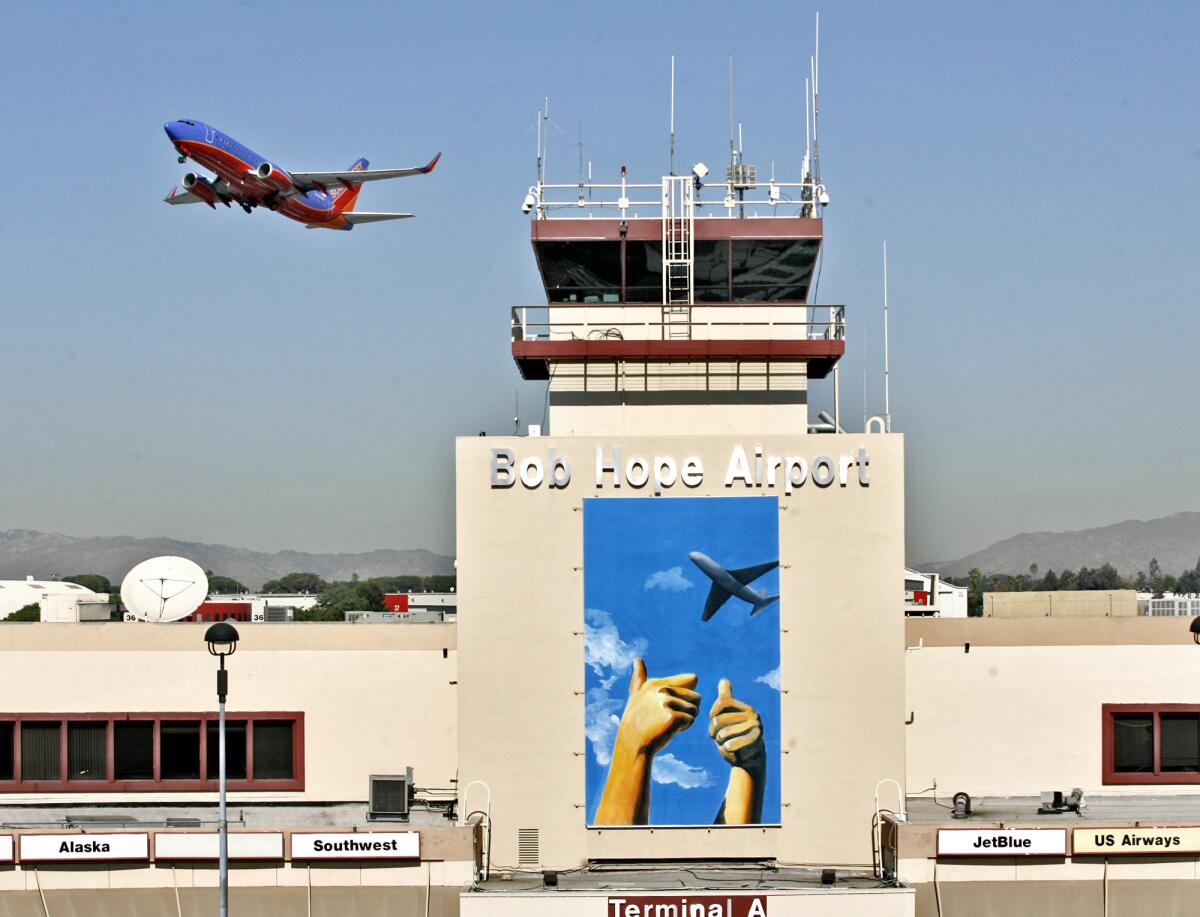Local officials travel to D.C. to make their case for nighttime curfew at Bob Hope Airport

A Southwest Airlines jet takes off from Bob Hope Airport in Burbank. Officials from the city of Burbank and the Burbank-Glendale-Pasadena Airport Authority will travel to Washington, D.C., next week to discuss setting a mandatory nighttime curfew at the airfield with federal officials.
- Share via
Burbank and airport officials are headed to Washington, D.C. to lobby for a long-sought mandatory nighttime curfew, part of a larger agreement that they formally started discussing regarding a possible replacement terminal at Bob Hope Airport.
This week, in their first public meeting since agreeing to a set of terms calling for the meeting and other conditions, Burbank’s elected officials announced the trip, facilitated by Rep. Adam Schiff (D-Burbank), to meet with the Federal Aviation Administration’s associate administrator of airports.
“The meeting next week is a culmination of years of hard work and compromise between the city and authority,” Schiff said in an emailed statement Thursday. “Given that both parties have approved putting the agreement before the voters, I am hopeful the FAA will provide their support as well, or allow us the opportunity to answer any questions and concerns they may have.”
In addition to discussing development plans, the meeting is also focused on getting a curfew at the Burbank airfield that would bar all landings and departures between 10 p.m. and 7 a.m. Currently, a voluntary curfew is now in place during those hours for commercial passenger flights.
Burbank City Atty. Amy Albano announced that the city would be moving its regular Tuesday council meeting to Monday at 6 p.m. in order to accommodate travel for Mayor Bob Frutos, Vice Mayor Jess Talamantes, Albano and Peter Kirsch, an attorney hired by the city to help on the airport issue.
“Really the timing was up to Congressman Schiff,” Albano said, adding that she felt both sides preferred to meet sooner than later. “None of us had control when that was going to happen.”
The city only learned of the opportunity for the meeting on Tuesday morning, Albano said. Only two council members can attend, in order to remain compliant with public meeting laws.
“I think everyone felt we can’t say no at this point,” Albano said. “We’re the ones that wanted it.”
Lucy Burghdorf, the airport’s spokeswoman, said the Airport Authority would be sending its board President Frank Quintero of Glendale, Burbank Commissioner Don Brown, Pasadena Commissioner Steve Madison, Executive Director Dan Feger and its attorney Tom Ryan. Glendale Commissioner Zareh Sinanyan, who also serves on that city’s council, may also attend, she said.
City officials and residents have sought a mandatory restriction on overnight takeoffs for decades, and airport officials have in the past supported such efforts, but the requirements of federal law has made enacting such a nighttime flight ban challenging.
In 1973, the U.S. Supreme Court struck down a Burbank ordinance banning overnight takeoffs in a 5-4 decision, holding that the FAA and Environmental Protection Agency have full control over aircraft noise.
The court said that upholding the Burbank ordinance could lead to other cities following suit, causing “fractionalized control of the timing of takeoffs and landings” that would impair the FAA’s ability to control air traffic flow. Justice William Douglas wrote in the opinion that the court was not “at liberty to diffuse the powers” given to the FAA and EPA.
“If that change is to be made, Congress alone must do it,” Douglas wrote.
In 1990, Congress passed a law creating a process for airport operators to seek noise and access restrictions. Nine years later, after reaching a settlement with the city that required it, the airport embarked on a nine-year, roughly $7-million study under that process, requesting that the FAA approve a curfew.
The 800-page study completed in early 2009 found that a full nighttime restriction between 2008 and 2015 would generate roughly $67 million in benefits for the public, compared to between about $56 million and $60 million for two less-restrictive curfews. It also noted “hard-to-quantify” benefits such as improved quality of life for residents.
It also found the full curfew would cost airlines, passengers, cargo carriers and general aviation $48 million, compared to $18 million and $41 million respectively for the alternative restrictions.
The FAA rejected that proposal in a 42-page ruling. Officials said the restriction failed to satisfy all six of the required conditions for the restrictions being sought because, among other objections, it was not reasonable and would “create an undue burden on commerce.”
The agency said the voluntary curfew had a high compliance rate and noted the availability of other measures, such as soundproofing homes.
In 2011 and 2013, Schiff sought legislation to enact the nighttime curfew, but those measures failed to pass out of committee. In June 2014, a third effort made it to a vote on the floor of the U.S. House of Representatives, but failed by a narrow margin of 208 to 212.
Feger and members of the authority board have said the airport plans to continue their support for a nighttime curfew, but as part of the proposed “conceptual terms” for an agreement on the replacement terminal, the authority has proposed amending its governance to allow Burbank a “veto” to block any future changes to that position of support.
--
Chad Garland, chad.garland@latimes.com
Twitter: @chadgarland
